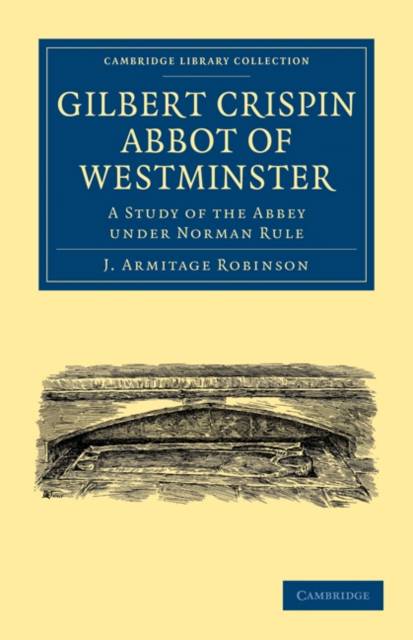
Je cadeautjes zeker op tijd in huis hebben voor de feestdagen? Kom langs in onze winkels en vind het perfecte geschenk!
- Afhalen na 1 uur in een winkel met voorraad
- Gratis thuislevering in België vanaf € 30
- Ruim aanbod met 7 miljoen producten
Je cadeautjes zeker op tijd in huis hebben voor de feestdagen? Kom langs in onze winkels en vind het perfecte geschenk!
- Afhalen na 1 uur in een winkel met voorraad
- Gratis thuislevering in België vanaf € 30
- Ruim aanbod met 7 miljoen producten
Zoeken
Gilbert Crispin Abbot of Westminster
A Study of the Abbey Under Norman Rule
J Armitage Robinson, Robinson J Armitage
€ 58,45
+ 116 punten
Omschrijving
Gilbert Crispin (c. 1045-1117/18), fourth abbot of Westminster Abbey, was a scion of an important Norman family. Trained at Bec under St Anselm, later archbishop of Canterbury, he was a noted scholar and theologian. Under his rule, Westminster Abbey began to expand physically and grow in importance, making full play of its position as the chosen burial site of Edward the Confessor. The necessity to raise funds for the building work probably led to Crispin's association with the London Jewish community, and this was to inspire his most important theological work, Disputation with a Jew. In this 1911 book, J. Robinson Armitage, then dean of Westminster, mines the abbey archives to write both a biography and a discussion of Crispin's thirty-year administration of Westminster. He also includes the texts of all Crispin's known writings, together with a selection of charters. A significant work on a hitherto neglected Anglo-Norman churchman.
Specificaties
Betrokkenen
- Auteur(s):
- Uitgeverij:
Inhoud
- Aantal bladzijden:
- 200
- Taal:
- Engels
- Reeks:
Eigenschappen
- Productcode (EAN):
- 9781108013581
- Verschijningsdatum:
- 26/08/2010
- Uitvoering:
- Paperback
- Formaat:
- Trade paperback (VS)
- Afmetingen:
- 140 mm x 216 mm
- Gewicht:
- 258 g

Alleen bij Standaard Boekhandel
+ 116 punten op je klantenkaart van Standaard Boekhandel
Beoordelingen
We publiceren alleen reviews die voldoen aan de voorwaarden voor reviews. Bekijk onze voorwaarden voor reviews.









